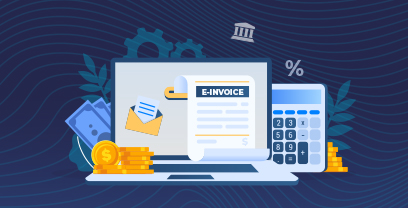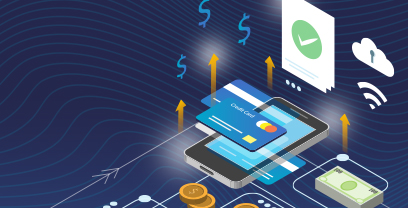E-invoicing, or electronic invoicing, is the digital exchange of invoice documents between a supplier and a buyer. Unlike traditional paper-based invoicing, e-invoicing involves the generation, sending, and reception of invoices in a structured electronic format.
This allows for automation in invoice processing, which can significantly improve the efficiency of billing operations and reduce costs associated with manual entry and storage.
In this post, we’ll take an in-depth look at the mandates for e-invoicing, focusing particularly on France’s new legislation. We’ll also explore how Ivalua’s advanced e-invoicing capabilities and Government Gateway can assist organizations in maintaining compliance effectively.
Global Shift Towards Mandatory E-Invoicing
Globally, there’s a growing shift toward mandatory e-invoicing as governments recognize its potential to streamline tax collection and combat fraud. According to KPMG, 55 countries worldwide have adopted or are considering adopting e-invoice mandates.
This includes meeting specific standards and real-time reporting to tax authorities, for the purpose of providing greater transparency and continuous control of commercial transactions. The goal is to promote a quicker validation process and improve compliance with tax obligations.
As these mandates spread across different regions, businesses are pushed to upgrade their systems and processes to stay compliant and competitive in the evolving digital economy. Learn more in our comprehensive guide to e-invoicing.
Now, let’s start with some mandate background information.
What Are ‘Continuous Transaction Controls’ (CTCs)?
Continuous Transaction Controls (CTCs) are measures that require businesses to report transaction data to tax authorities in real-time or near-real-time, aiming to improve tax compliance and reduce fraud.
This system mandates electronic submission of invoices at the time transactions occur, facilitating immediate oversight and accuracy in tax reporting. The introduction of CTCs reflects a global trend toward digital tax reporting to enhance efficiency and minimize tax evasion.
CTCs and e-invoicing Legislation
Countries across Europe, Latin America and Asia are adopting CTCs with e-invoicing requirements. For example, France is actively moving towards implementing CTCs with its upcoming e-invoicing legislation.
Set to phase in starting July 2026, the mandate requires all companies operating in France to issue and receive invoices electronically. This initiative aims to enhance tax compliance through real-time or near-real-time data transmission to tax authorities, reduce tax fraud, and increase the efficiency of the tax system.
What Is the French e-invoicing Mandate?
The France e-invoicing mandate is part of a broader initiative by the French government to digitize tax compliance and invoicing processes across the country. Scheduled to be phased in from September 2026, this mandate will require all companies operating in France to send and receive invoices electronically. The rollout will begin with large enterprises, followed by mid-sized and then small businesses by September 2027.
With a view to combating VAT fraud (accidental non payment), France has decided to move towards a “mixed CTC model” which will include mandatory B2B e-invoicing and e-reporting. The goals of this mandate are multi-faceted:
- Enhancing Tax Compliance: By automating the invoicing process, the French government aims to reduce tax evasion by ensuring that all transactions are recorded and traceable in real-time. This will help in closing the VAT (Value Added Tax) gap.
- Increasing Efficiency: E-invoicing will streamline the billing and payment processes, reducing the time and cost associated with manual invoicing and payment chasing.
- Promoting Digital Transformation: This initiative is also seen as a push for digital transformation in the business sector, encouraging companies to modernize their financial systems and processes.
This move aligns with similar initiatives in other European countries, reflecting an ongoing trend towards greater fiscal digitalization within the EU to improve economic transparency and efficiency.
How to Prepare for the France e-invoicing Mandate
As France gears up to implement its e-invoicing mandate, businesses operating within or trading with French entities need to prepare thoroughly to ensure compliance.
- Understanding the Mandate Requirements
The first step in this preparation is to understand the specific requirements of the French e-invoicing system, which mandates that all invoices be processed electronically to streamline tax reporting and reduce fraud. This requires familiarizing oneself with the legal framework, particularly regarding the types of invoices affected and the deadlines for compliance.
- Evaluating Current Invoicing Processes and Systems
Next, businesses should evaluate their current invoicing processes and systems. This evaluation should determine whether existing systems can be adapted to comply with the new regulations or if new e-invoicing software needs to be acquired. It’s crucial to select a solution that not only meets French regulatory requirements but also integrates seamlessly with your existing ERP or accounting systems.
For many businesses, this will mean either choosing a platform that offers a Pre-built Government Gateway for France with a digital AP experience or trying to bolt a 3rd Party Network into their paper process flows.
The latter ticks the IT box but ensures that the AP team will become swamped with exceptions. The former ensures that invoices can be processed in real-time directly from the suppliers and then reported to the French tax authorities in the required format.
- Training and Transitioning
Finally, once a suitable e-invoicing system is in place, thorough testing and training are essential. Testing the system ensures that it can handle all invoicing tasks in compliance with French regulations, including the transmission and reception of electronic invoices, and the generation of necessary reports.
Training must be provided not just for the finance team, but also for all stakeholders involved in the invoicing process to familiarize them with the new system’s functionalities and workflows.
This preparation phase is critical to ensure a smooth transition to e-invoicing, avoiding penalties for non-compliance and ensuring continued smooth operations with French clients and suppliers.
Learn more about streamlining continuous transaction controls with Ivalua’s Government Gateway
Timelines for the France e-invoicing and e-reporting Mandate
The timeline for complying with the French e-invoicing mandate can be outlined as follows, though specific dates may vary based on the latest legislative updates and the size or type of business:
- Initial Preparation (Immediate): Companies should start by familiarizing themselves with the details of the mandate, including obligations and key deadlines.
- System Evaluation and Selection (6-12 months before the mandate): Businesses need to evaluate their current invoicing systems and processes to determine whether they meet the new requirements.
If the existing systems are not compliant, businesses should select an appropriate e-invoicing solution that integrates with leading ERP systems and meets the French government’s technical and security standards.
- Implementation and Integration (3-9 months before the mandate): The next step is to implement and integrate the chosen system with the existing financial and operational systems. This phase includes configuring the software, testing interoperability with other business systems, and ensuring that the solution can handle all invoicing scenarios compliantly.
- Testing and Training (1-3 months before the mandate): After implementation, thorough testing is essential to ensure the system works as expected under various scenarios, as well as comprehensive training for all users.
- Go-Live and Continuous Compliance (From the mandate effective date onward): Companies should plan to go live with the new system ahead of the mandate’s official start date to address any last-minute challenges. Continuous monitoring and updates will be necessary post-implementation to ensure ongoing compliance as rules evolve.
Automate Your Account Payables Process with Ivalua’s e-Invoicing
Ivalua’s e-invoicing software significantly enhances supplier management and collaboration, and maintains transparency throughout the payment processes.
Ivalua offers a plug-n-play Plateforme de Dématérialisation Partenaire (PDP) service that integrates seamlessly with leading ERP systems or our digital payables experience.
As a platform certified to ISO 27001 standards, Ivalua simplifies the tasks of both sending and receiving invoices plus all the mandatory tax reporting. The Ivalua digital payable solution offers several key functionalities, each designed to streamline Invoice-to-Pay Processes and improve efficiency:
- Invoice Data Capture (IDC): This tool uses advanced automation to capture invoice data from multiple formats, significantly reducing the likelihood of errors and accelerating the invoice processing workflow. This ensures invoices are processed more efficiently, saving time and reducing manual labor.
- E-invoicing: Ivalua supports digital invoicing which allows for quicker processing and real-time approval of invoices. This functionality not only enhances the accuracy of invoicing but also improves cash flow management and improves supplier relationships by ensuring timely payments.
- Invoice Hub: Centralization is a key factor in efficient financial management and compliance adherence. The Hub is a centralized interface that aggregates all invoices, which simplifies the management of incoming and outgoing payments. It enhances transparency, making it easier to track payments and conduct audits.
- AP Automation: Ivalua’s platform automates various accounts payable tasks, including intelligent invoice matching and payment processing. This automation reduces the workload on staff, minimizes the chance of human error, and lessens the risk of fraud, all while ensuring that payments are processed swiftly and correctly.
- Government Gateway: This feature is tailored for businesses that deal with government contracts, facilitating compliance and efficient transaction processing with government entities. It seamlessly integrates these processes into the broader S2P workflow, ensuring that all transactions are transparent and meet regulatory standards.
Together, these features not only improve the operational efficiency of businesses but also enhance relationship management, optimize supply chain operations, and support more informed decision-making.
Learn more in in our blog: Invoice-to-Pay: Seamless Payments With Automated Invoicing
Government Gateway: Simplifying Compliance Across Borders
Combining PDP functionality with powerful Accounts Payable rules and a free Supplier Portal, Ivalua’s Government Gateway ensures compliance with various government regulations and simplifies the process of reporting to authorities. Features include:
- Auto-reject incorrect or duplicated invoices
- Auto-answer inquiries with real-time status
- Auto-match invoices with PO’s, receipts, and contracts
By integrating directly with government portals, it helps public sector clients and businesses dealing with government contracts manage their transactions and compliance more efficiently. This is particularly important in regions with strict reporting requirements and can significantly reduce the administrative burden associated with government procurement processes.
Meet Global e-invoicing Requirements with Ivalua
As global e-invoicing mandates become increasingly prevalent, businesses must adapt to keep pace with evolving regulations and ensure compliance.
Ivalua’s solution offers a robust and comprehensive approach to managing these new requirements, enabling seamless integration, real-time processing, and adherence to international standards. Ivalua’s advanced e-invoicing software enable companies to be more efficient, accurate and compliant as global mandates evolve.
Ready to transform your invoicing strategy? Discover how Ivalua can help your business navigate the complexities of global e-invoicing mandates and improve your procurement processes by watching our Strategic Payments demo or contacting our e-invoicing experts!



